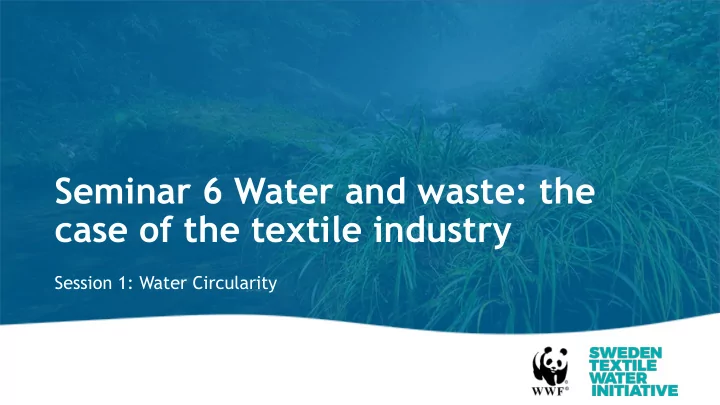

Seminar 6 Water and waste: the case of the textile industry Session 1: Water Circularity
Seminar 6: Water and Waste Global Local business Action Collaborative brand models and initiatives the SDGs Session 1 Session 2 Session 3
Agenda 09:00 Introduction: Laila Petrie , WWF, and Rami Narte , STWI/SIWI 09:05 Wastewater management in Egyptian textile industry sector. Rifaat Abdel Wahaab , Holding Co. for Water and Wastewater 09:15 From field to fashion: examining textile’s grey water footprint. Christopher Briggs , WFN 09:30 Poster Presentation , Sohail Ali Naqvi , WWF 09:45 Fishbowl: Scalability, continuity, collaboration, barriers and potentials of water stewardship in manufacturing industry - Rifaat Abdel Wahaab , Holding Co.for Water and Wastewater - Christopher Briggs , WFN - Zhao Lin , STWI - Sohail Ali Naqvi , WWF 10:25 Conclusions. Laila Petrie , WWF, and Rami Narte , STWI/SIWI 10:30 Close of session
12.2 By 2030, achieve the sustainable management and 6.3 By 2030, improve water quality by reducing pollution, efficient use of natural resources eliminating dumping and minimising release of hazardous chemicals and materials, halving the proportion of untreated wastewater and 12.4 By 2020, achieve the environmentally sound management substantially increasing recycling and safe reuse globally of chemicals and all wastes throughout their life cycle, in 6.4 By 2030, substantially increase water use efficiency accordance with agreed international frameworks, and significantly reduce their release to air, water and soil in order to across all sectors and ensure sustainable withdrawals and supply of freshwater to address water scarcity and substantially minimize their adverse impacts on human health and then reduce the number of people suffering from water scarcity environment 12.6 Encourage companies , especially large and transnational 6.5 By 2030 , implement integrated water resources management at all levels, including through transboundary companies, to adopt sustainable practices and to integrate cooperation as appropriate sustainability information into their reporting cycle
Fishbowl: Scalability, continuity, collaboration, barriers and potentials of water stewardship in manufacturing industry Instructions : Panel discussion on key points raised by panelists One panellist must voluntarily leave whenever a participant in the audience joins the panel New participant on the panel shortly presents views or questions to the panel Let’s have an open, constructive, inclusive dialogue and reflect on personal experiences, successes and failures (and lessons learned).
Seminar 6 Water and waste: the case of the textile industry Session 2: Scalability and continuity of brand initiatives in the textile sector
Seminar 6: Water and Waste Global Local business Action Collaborative brand models and initiatives the SDGs Session 1 Session 2 Session 3
Agenda 11:00 Introduction Laila Petrie, WWF 11:05 STWI initiative Katarina Veem, SIWI 11:15 The ZDHC wastewater discharge guideline for the textile industry John Rydzewski, Nike Inc. 11:25 Targets and textiles: Target setting in the private sector Orlaith Delargy, CDP 11:35 Fish Bowl: Catalysing scalable, continuous and collaborative approach for water stewardship, limitations of SMEs, visibility of programs, and root cause of failure - Baptiste Carriere-Pradal, SAC - Elin Larsson, Fillippa K - Maike Hiltner, Adidas - Katarina Veem, SIWI - John Rydzewski, Nike Inc. - Orlaith Delargy, CDP 12:25 Conclusions Petrie, WWF 12:30 Close of session
Fishbowl: Catalysing scalable, continuous and collaborative approaches for water stewardship, limitations of SMEs, visibility of programs, and root cause of failures Instructions : Panel discussion on key points raised by panelists One panellist must voluntarily leave whenever a participant in the audience joins the panel New participant on the panel shortly presents views or questions to the panel Let’s have an open, constructive, inclusive dialogue and reflect on personal experiences, successes and failures (and lessons learned).
Seminar 6 Water and waste: the case of the textile industry Session 3: Global business models and systemic changes to achieve SDGs
Seminar 6: Water and Waste Global Local business Action Collaborative brand models and initiatives the SDGs Session 1 Session 2 Session 3
Agenda 14:00 Introduction Rami Narte, STWI/SIWI 14:05 Taking Textile Water Stewardship to the next level Charlotte Järnmark, WWF, and Shariful Hoque, H&M 14:20 Discussion: Global business models and systemic changes to achieve the SDGs Lisa Hook, GAP Laila Petrie, WWF Dawn McGregor, China Water Risk 15:20 Conclusions and recommendations Laila Petrie, WWF, and Rami Narte, STWI/SIWI 15:30 Close of session
12.2 By 2030, achieve the sustainable management and 6.3 By 2030, improve water quality by reducing pollution, efficient use of natural resources eliminating dumping and minimising release of hazardous chemicals and materials, halving the proportion of untreated wastewater and 12.4 By 2020, achieve the environmentally sound management substantially increasing recycling and safe reuse globally of chemicals and all wastes throughout their life cycle, in 6.4 By 2030, substantially increase water use efficiency accordance with agreed international frameworks, and significantly reduce their release to air, water and soil in order to across all sectors and ensure sustainable withdrawals and supply of freshwater to address water scarcity and substantially minimize their adverse impacts on human health and then reduce the number of people suffering from water scarcity environment 12.6 Encourage companies , especially large and transnational 6.5 By 2030 , implement integrated water resources management at all levels, including through transboundary companies, to adopt sustainable practices and to integrate cooperation as appropriate sustainability information into their reporting cycle
Recommend
More recommend